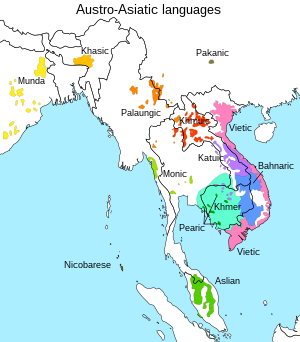Mon-Khmer language
| Austroasiatic | |
|---|---|
| Mon–Khmer | |
| Geographic distribution |
South and Southeast Asia |
| Linguistic classification | One of the world's primary language families |
| Proto-language | Proto-Mon–Khmer |
| Subdivisions | |
| ISO 639-5 | |
| Glottolog | aust1305 |

Austroasiatic languages
|
|
The Austroasiatic languages, in recent classifications synonymous with Mon–Khmer, are a large language family of Mainland Southeast Asia, also scattered throughout India, Bangladesh, Nepal and the southern border of China, with around 117 million speakers. The name Austroasiatic comes from the Latin words for "South" and "Asia", hence "South Asia". Of these languages, only Vietnamese, Khmer, and Mon have a long-established recorded history, and only Vietnamese and Khmer have official status as modern national languages (in Vietnam and Cambodia, respectively). On the subnational level, Khasi has official status in Meghalaya while Santhali, Ho and Mundari are official languages of Jharkhand. In Myanmar, the Wa language is the de facto official language of Wa State. The rest of the languages are spoken by minority groups and have no official status.
Ethnologue identifies 168 Austroasiatic languages. These form thirteen established families (plus perhaps Shompen, which is poorly attested, as a fourteenth), which have traditionally been grouped into two, as Mon–Khmer and Munda. However, one recent classification posits three groups (Munda, Nuclear Mon-Khmer and Khasi–Khmuic) while another has abandoned Mon–Khmer as a taxon altogether, making it synonymous with the larger family.
...
Wikipedia
